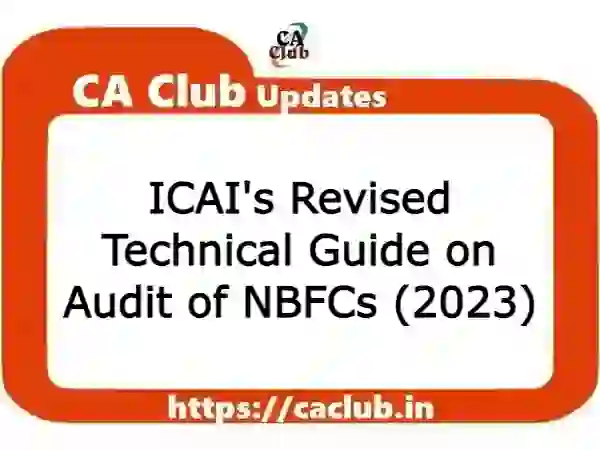ICAI has released revised 2023 edition of the “Technical Guide on Audit of Non-Banking Financial Companies (NBFCs)”, to provide detailed guidance to the members regarding audit of NBFCs.
About NBFCs
NBFCs represent a pivotal segment of India’s diverse financial sector. Catering to a wide array of funding demands from both structured and unstructured sources, NBFCs act as essential lifelines for smaller industries, independent entrepreneurs, and self-employed individuals, among others. Given the manifold assortment of services they offer and the substantial volume of public finance under their purview, a robust and meticulously maintained environment for financial reporting is imperative for NBFCs.
Regulatory Overview
Recognizing the gravity of the requirement of financial reporting by NBFcs, the Reserve Bank of India (RBI) consistently oversees and modifies the regulatory structure for NBFCs. The aim is to instill a comprehensive sense of discipline in relation to not just the registration but also the operational aspects of NBFCs. This proactive regulatory adjustment facilitates appropriate monitoring and ensures informed decision-making, consequently promoting financial stability within this influential sector.
ICAI Insights
In this context, the Auditing and Assurance Standards Board (AASB), under the auspices of ICAI, assumes a significant role. The AASB undertakes a detailed analysis of the frameworks instituted by the RBI and subsequently identifies unique areas within statutory auditing that warrant particular attention. Recognizing the distinct characteristics and financial peculiarities possessed by NBFCs, the insights provided by the AASB further augment the existing regulatory structures, effectively enhancing transparency, accuracy, and accountability within this key segment of India’s financial system.
Revised Technical Guide (2023)
Accordingly, the AASB of ICAI released its up-to-date 2023 edition of the “Technical Guide on Audit of Non-Banking Financial Companies (NBFCs)”. The purpose of this extensive guide is to offer comprehensive assistance and insight to ICAI members on a diverse array of aspects pertaining to NBFC audits.
This guide was previously revamped in 2016. However, since that time, a multitude of new developments have emerged that have significantly impacted NBFCs. These include the introduction of Indian Accounting Standards to specific NBFC categories as well as the issuance of several master directives, circulars, guidelines, and notifications all pertaining to NBFCs. These evolving changes necessitated the AASB thoroughly revising the Technical Guide.
The revised 2023 edition of the Technical Guide addresses a vast array of aspects surrounding the audit of NBFCs. These include the introduction and overview of NBFCs, key considerations for auditing such entities, the financial reporting framework, the auditing framework, potential areas of audit concern, the general operations of NBFCs, governance protocols, and more.
In a bid to extend resources, aid, and direction to ICAI members, this Technical Guide is equipped with robust appendices, which includes a myriad of illustrative templates for audit reports and certificates, an exhaustive audit checklist, a comprehensive directory of master directions, circulars, and Reserve Bank of India (RBI) notifications. Moreover, it also contains illustrative norms for NBFC disclosure, an inclusive list of returns that NBFCs must submit, and much more.
Objectives, Scope and Limitations
The practical relevance of this enriched version of the Technical Guide holds firm across various NBFC spectrums. The key objective of this guide is to empower auditors with practical insights systematically aligned with mandates imposed by the RBI. Furthermore, it aims to encourage best practices in implementing auditing standards (SAs) during the audit of financial statements of NBFCs.
It is important to clearly comprehend that this improved guide isn’t designed to provide a comprehensive catalog of all procedures and best practices that might be necessary for an audit of this type. When an auditor is functioning in harmony with the Standard on Auditing, fulfilling all relevant requirements as stipulated by the SAs becomes imperative.
It is worth noting that there could be instances when this technical guide is not applicable. Examples of such scenarios include guidance that may be specific or unique to the regulations outlined by the regulatory authorities that govern the NBFCs or investment firms.
This technical guide devotes concentrated effort towards addressing the assertions made towards financing activities captured in the financial records of the NBFCs. The discourse of this guide is ingrained in both the components of the financial statements as well as the intricacies of the NBFC’s activities.
While accumulating auditable evidence to substantiate the assertions of the financial statements, it is essential for auditors to design their course of action based on the specific activities of the NBFC. Another crucial element is how these activities influence the assertions in the financial statements. For a comprehensive understanding of audit requirements for NBFCs, auditors are advised to reference RBI Master Directions, Circulars, and other associated guidelines.
Conclusion
The release of the updated “Technical Guide on Audit of Non-Banking Financial Companies (NBFCs)” by ICAI serves a vital role in augmenting the regulatory landscape for NBFCs in India. Given significant changes that have an impact on NBFCs as well as RBI mandates, it offers insightful information about audit practices. While the guide offers exhaustive guidelines and resources, it’s crucial for auditors to align their procedures with the Standard on Auditing and reference specific RBI regulations. As such, the guide serves as a cornerstone for enhancing accountability, transparency, and financial stability within India’s pivotal NBFC sector.
ICAI’s Technical Guide on Audit of NBFCs (Revised 2023 Edition)
